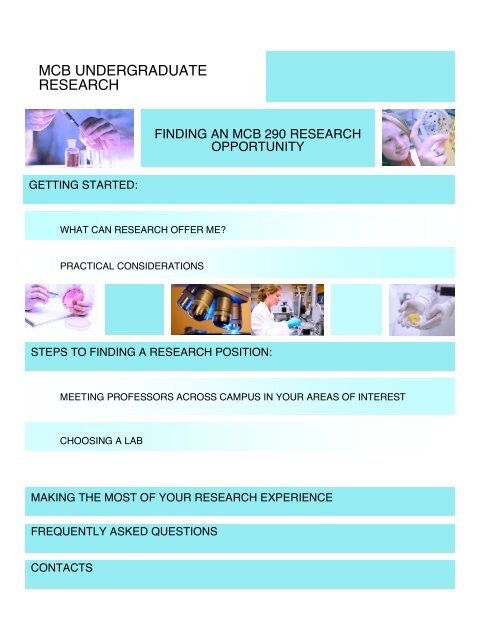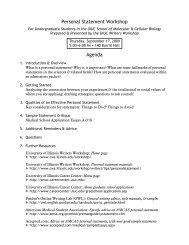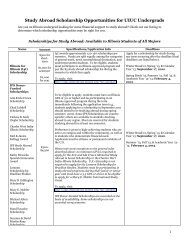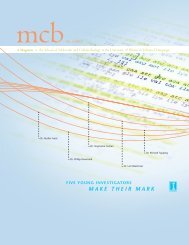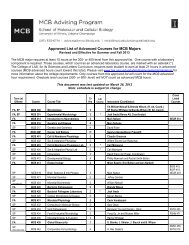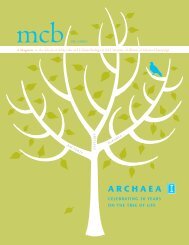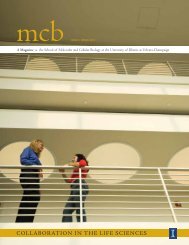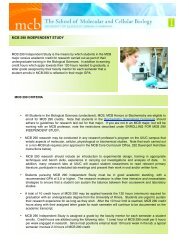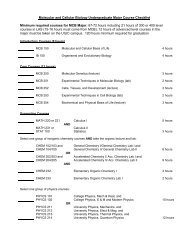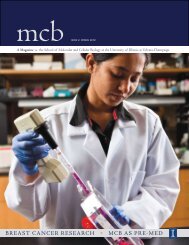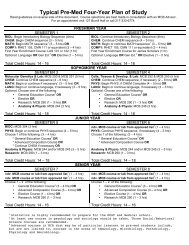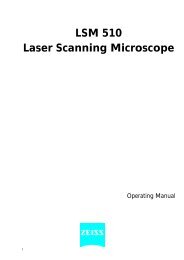mcb undergraduate research - The School of Molecular and Cellular ...
mcb undergraduate research - The School of Molecular and Cellular ...
mcb undergraduate research - The School of Molecular and Cellular ...
- No tags were found...
You also want an ePaper? Increase the reach of your titles
YUMPU automatically turns print PDFs into web optimized ePapers that Google loves.
MCB UNDERGRADUATERESEARCHFINDING AN MCB 290 RESEARCHOPPORTUNITYGETTING STARTED:WHAT CAN RESEARCH OFFER ME?PRACTICAL CONSIDERATIONSSTEPS TO FINDING A RESEARCH POSITION:MEETING PROFESSORS ACROSS CAMPUS IN YOUR AREAS OF INTERESTCHOOSING A LABMAKING THE MOST OF YOUR RESEARCH EXPERIENCEFREQUENTLY ASKED QUESTIONSCONTACTS
GETTING STARTED:WHAT CAN RESEARCH OFFER ME?Irrespective <strong>of</strong> your career goals, your training in the biological sciences st<strong>and</strong>s to benefit substantially from<strong>research</strong> at the University <strong>of</strong> Illinois.• Learn where scientific “facts” originate• Develop h<strong>and</strong>s on skills with current tools <strong>and</strong> technologies• Enhance science-base verbal <strong>and</strong> written skills• Build critical thinking <strong>and</strong> data analysis abilities• Explore <strong>and</strong> refine career directions• Develop pr<strong>of</strong>essional ties for future opportunitiesPRACTICAL CONSIDERATIONSAt the beginning <strong>of</strong> your search for a lab ask:• Can I plan for at least two semesters <strong>of</strong> <strong>research</strong>? For most students, a laboratory <strong>research</strong> endeavor isa new, unfamiliar experience. As such, it takes time to integrate into the working envirnocment <strong>and</strong>relationships, adapt to the structure <strong>and</strong> culture <strong>of</strong> a lab <strong>and</strong> begin to underst<strong>and</strong> the goals/ objectives <strong>of</strong> agiven lab. It’s not unusual for this period <strong>of</strong> adjustment to absorb the first semster in <strong>research</strong> – perhapsmore. Many <strong>research</strong> pr<strong>of</strong>essors know that in order for you t reap the benefits <strong>of</strong> your <strong>research</strong> effort, aminimum <strong>of</strong> two semester sis necessary. Of course, most would encourage you to consider developingyour <strong>research</strong> skills for as long as you are able.• Do I have at least 10 hours/week in 3 or 4 hour time periods to work in the lab? Am I willing to beflexible? Your progress in <strong>research</strong> requiresa minimum commitment <strong>of</strong> time that will ensure that youallow yourself to go deeply enough into tquestions to engage with them in a satifying way. Most <strong>research</strong>proessor will recommend at least 10 hours per week. Because most <strong>research</strong> involves planning,procedures <strong>and</strong> corrdination with others, you should pln to sturcutre your week such that it allows for labtime in portions <strong>of</strong> 3 or more hours.• Do I have enough time to h<strong>and</strong>le both academics <strong>and</strong> <strong>research</strong>? Once you begin a <strong>research</strong> position,you will be expected to be as dedicated to your lab studies as much as your coursework <strong>and</strong> otheractivities. This will required that you:o Develop a time management strategy that allows you to complete the requirements <strong>of</strong> bothin aosustainable wayKeep open lines <strong>of</strong> communication with your mentor. Don’t histitate to anticipate dem<strong>and</strong>ingtimes in yoru classes <strong>and</strong> request a shfiitng <strong>of</strong> <strong>research</strong> hours during peak study times.• Can I be as committed to my <strong>research</strong> effort as my coursework?• Do I qualify for MCB 290? <strong>The</strong> MCB 290 has no course rerequirements or stipulations with respect toyour year in school. <strong>The</strong> recommended overall GPA 3.0. For complete instructions regarding the MCB290 Independent Study credits, see the “MCB 290 Independent Study” h<strong>and</strong>out.STEPS TO FINDING A RESEARCH POSITION:Ask yourself: “If I were a <strong>research</strong> scientist, what would I look for in a student?”Overall, many MCB pr<strong>of</strong>essors describe the successful student <strong>research</strong>er as someone who is…• keen to ask -- or learn how to ask -- questions in a <strong>research</strong> setting.• eager to learn how to communicate their science with others in discussions <strong>and</strong> through writing.• motivated to dig into <strong>research</strong> seriously enough to see if it is something s/he wants to continue doing!Note that these qualities have more to do with attitude rather than specific skills, content knowledge or GPA!
MEETING PROFESSORS ACROSS CAMPUS IN YOUR AREAS OF INTEREST<strong>The</strong> pr<strong>of</strong>essors are accustomed to being approached by students interested in joining their lab! Don’t hesitate tospeak with an instructor in one <strong>of</strong> your courses, one with whom a friend may be working or who attends <strong>research</strong>seminars you’re interested in. In addition you should:1. Make a list <strong>of</strong> your areas <strong>of</strong> scientific interest (if any). If you’re a Biological Sciences or MCB student youmight wish to begin with <strong>research</strong> labs in MCB. Go to the MCB Faculty Interest web page:http://www.<strong>mcb</strong>.uiuc.edu/faculty/by_<strong>research</strong>.2. Click on the links to individual MCB faculty websites (or see separate h<strong>and</strong>out for suggested colleges,schools <strong>and</strong> departments outside <strong>of</strong> MCB too) <strong>and</strong> read:a. Descriptions <strong>of</strong> a pr<strong>of</strong>essor’s <strong>research</strong> <strong>and</strong>, perhaps,b. Recently published abstracts/ papers for those <strong>of</strong> interest.3. Make a list <strong>of</strong> the faculty whose <strong>research</strong> programs interest you, then:4. Get in touch with the <strong>research</strong> pr<strong>of</strong>essors…For example, to each pr<strong>of</strong>essor on your list, email a separateletter <strong>of</strong> inquiry that contains:*a. Your pr<strong>of</strong>ile information: semester(s) requested, previous lab experience, etc.b. Description <strong>of</strong> your goalsc. Justification for your interest in <strong>research</strong>* Note: Using the MCB 290 Pr<strong>of</strong>ile Database when contacting MCB pr<strong>of</strong>essors is recommended! See the“MCB 290 Student Pr<strong>of</strong>ile Database” h<strong>and</strong>out.5. Send follow-up emails: To express thanks, to set up an “interview” appointment with a pr<strong>of</strong>essor or to provideadditional information if requested. If you don’t receive replies from pr<strong>of</strong>essors you’ve contacted, get back in touchin a week or so <strong>and</strong> remind them <strong>of</strong> your wish to speak with them about your interest in <strong>research</strong>!6. Meet with pr<strong>of</strong>essors to discuss possible <strong>research</strong> opportunities in their programs.During any semester, students in the <strong>School</strong> <strong>of</strong> MCB frequently find <strong>research</strong> positions outside <strong>of</strong> MCB inother colleges <strong>and</strong> departments across the Illinois campus. Examples include:College <strong>of</strong> LAS:• <strong>School</strong> <strong>of</strong> Integrative Biology (Plant Biology, Animal Biology, Entomology): http://www.life.uiuc.edu/sib/)• Psychology: http://s.psych.uiuc.edu/home/index.php• Chemistry Department (e.g. Chemical Biology): http://www.chemistry.uiuc.edu/Institutes <strong>of</strong> Multidisciplinary Research: For example:• <strong>The</strong> Beckman Institute: http://www.beckman.illinois.edu/biointel/index.aspx• <strong>The</strong> Institute for Genomic Biology: http://www.igb.uiuc.edu/• <strong>The</strong> Center for Biophysics <strong>and</strong> Computational Biology: http://www.life.uiuc.edu/biophysics/College <strong>of</strong> Applied Health Sciences: http://www.kch.uiuc.edu/College <strong>of</strong> Veterinary Medicine: http://vetmed.illinois.edu/College <strong>of</strong> Engineering: http://engineering.illinois.edu/College <strong>of</strong> ACES:• Crop Sciences: http://www.cropsci.uiuc.edu/index.cfm• Animal Sciences: http://www.ansci.uiuc.edu/• Food Science <strong>and</strong> Human Nutrition: http://fshn.illinois.edu/
CHOOSING A LABWHEN YOU MEET WITH A PROFESSOR:1. Think in advance about what you’re hoping for in a <strong>research</strong> position: For example: Interested in<strong>research</strong> that has the potential for independent work? Or studies that might lead to a MCB 492 Senior<strong>The</strong>sis <strong>and</strong>, perhaps, graduating with distinction? Or <strong>research</strong> that entails certain types <strong>of</strong> work – e.g.computer-based? Bench work? Some “field” work? Go prepared to talk about your goals <strong>and</strong> toexplore how you can pursue them in the labs you wish to join.2. Be sure to underst<strong>and</strong> the nature <strong>of</strong> the work <strong>and</strong> expectations for students working in theirlab --<strong>and</strong> your own ability to participate in these ways. How many hours/week? Will there be anestablished schedule? With whom will you be working? Are there lines <strong>of</strong> communication? What is thenature <strong>of</strong> the work – independent or more observational? Will it involve work with animals that you’recomfortable with? Will you be expected to attend/ discuss data at lab meetings or read primarypapers? Etc…TO GET MCB 290 INDEPENDENT STUDY CREDIT FOR YOUR RESEARCH:For complete information on receiving MCB 290 credit, see the “MCB 290 Independent Study” h<strong>and</strong>out. Toqualify you must:• Find a <strong>research</strong> pr<strong>of</strong>essor who agrees to mentor your studies in his/her <strong>research</strong> program.*• Conduct your <strong>research</strong> in a molecular, cellular, physiol. or biochem. <strong>research</strong> program on the UIUCcampus.1 credit hour = 5 hours/ week in the lab; A letter grade is assigned by your faculty mentor for eachsemester you enroll in MCB 290.* Restrictions may apply based on your major.MAKING THE MOST OF YOUR RESEARCH EXPERIENCEConducting <strong>undergraduate</strong> <strong>research</strong> at a <strong>research</strong> institution like the University <strong>of</strong> Illinois is a singularopportunity to participate in science on the leading edge <strong>of</strong> discovery. As you begin your studies in an UIUClab, review your goals <strong>and</strong> think about ways that you can ensure that they will occur. If you want to:Build stronger skills in analytical thinking <strong>and</strong> oral + written communication• Participate in the planning <strong>of</strong> experiments <strong>and</strong> analysis <strong>of</strong> data.• Read primary literature related to your <strong>research</strong>. Ask lab members for recommended reading.• Attend <strong>and</strong> present your work at lab meetings -- Participate in the lab discussions.• Attend <strong>research</strong> seminars. Consider presenting a talk!o MCB Undergraduate Research Seminar Series (URSS; FA <strong>and</strong> SP)o Campus-wide Undergraduate Research Symposium (April)o LIGASE Open House (April)In ALL <strong>of</strong> the above: Ask questions!
Explore post-graduation options• Talk to grad students, post docs <strong>and</strong> pr<strong>of</strong>essors about science careers -- Network!• Attend MCB <strong>and</strong> Career Center workshops on graduate degrees <strong>and</strong> science careers.• Apply for fellowships, scholarships, internships -- supplement your <strong>research</strong> experience with otheropportunities to explore your interests <strong>and</strong> skills.Finish with a strong letter <strong>of</strong> recommendation:• Write your dream recommendation letter, then –• Ask yourself: “What do I need to do in order for my mentor to say these things about me?” <strong>The</strong>n –• Demonstrate your awareness <strong>and</strong> capacity for these qualities <strong>and</strong> skills. E.g your—o dedication to scienceo ability to grasp the significance <strong>of</strong> your worko bench skillso analytical thinkingo attention to detailo awareness <strong>and</strong> interest in the work <strong>of</strong> other lab memberso teamwork <strong>and</strong>o emerging communication skillsFREQUENTLY ASKED QUESTIONSFAQ’s:• When is the best time to begin <strong>undergraduate</strong> <strong>research</strong>? This depends on your goals <strong>and</strong> abilityto h<strong>and</strong>le both a course load <strong>and</strong> <strong>research</strong>. Some students begin working in labs as freshmen, othersfind that they are best prepared after completing one or more <strong>of</strong> the MCB core classes – i.e. eitherspring <strong>of</strong> sophomore year or early junior year. Some pr<strong>of</strong>essors prefer students who are at a particularplace in their <strong>undergraduate</strong> coursework – If so, they will inform you <strong>of</strong> this when you contact them.Try to not wait until senior year-- limited time may preclude your option <strong>of</strong> fully exploring the <strong>research</strong>experience. For this reason, some pr<strong>of</strong>essors will not extend <strong>research</strong> opportunities to seniors. It’snever too early to explore if you’re interested <strong>and</strong> motivated!• Is it possible to enroll for MCB 290 in the summer? Yes, in fact the typical summer semester <strong>of</strong>fersmore hours in the lab <strong>and</strong> greater schedule flexibility that can translate into more rapid progress inyour work <strong>and</strong> a seamless transition into <strong>research</strong> for the fall semester. If summer <strong>research</strong> at UIUC isan option for you, mentioning this to pr<strong>of</strong>essors with whom you speak may place you at advantage.• What if I haven’t found a <strong>research</strong> position by the time I need to register classes? Go ahead<strong>and</strong> register for your classes, but reserve time in your M-F daytime schedule for <strong>research</strong> -- thencontinue to contact <strong>research</strong> pr<strong>of</strong>essors. If necessary, you will be able to add MCB 290 after the newterm starts by receiving permission in the MCB Core Curriculum Office in 252 Davenport Hall (See theMCB 290 Independent Study h<strong>and</strong>out).
FAQ’s:• Is there a limit to the number <strong>of</strong> hours <strong>of</strong> MCB 290 credit I can have? <strong>The</strong>re is no limit to thenumber <strong>of</strong> hours <strong>of</strong> MCB 290 for which you can enroll, however only 10 hours will apply to yourtotal hours needed (120 hours) for graduation. Once you accumulate 10 hours <strong>of</strong> MCB 290 credits,additional hours <strong>and</strong> assigned grades will continue to be documented on your academic record.• Is it possible to be paid AND receive credit for my <strong>research</strong>? No, not simultaneously for the samework. For more information, see the MCB 290 Independent Study h<strong>and</strong>out.• Can I receive MCB 290 credit for my <strong>research</strong> at another institution? No, but you are encouragedto take advantage <strong>of</strong> these unique opportunities. Such experiences may enhance your ability to find a<strong>research</strong> position at Illinois, make you more competitive for summer <strong>research</strong> fellowships <strong>and</strong> provideevidence <strong>of</strong> a richer, more varied <strong>research</strong> experience as an <strong>undergraduate</strong>! Of course, you c<strong>and</strong>ocument that experience in the future on your resume <strong>and</strong> potentially receive a letter <strong>of</strong>recommendation for future educational <strong>and</strong> career goals.CONTACTSFor help with any aspect <strong>of</strong> your under graduate <strong>research</strong> goals:• Access the h<strong>and</strong>outs, pod casts <strong>and</strong> student interviews linked to the MCB Undergrad. Researchwebpage: http://<strong>mcb</strong>.illinois.edu/undergrad/<strong>research</strong>.html.• Attend MCB Undergraduate Research workshops -- get advice from both pr<strong>of</strong>essors <strong>and</strong> studentsalready engaged in <strong>research</strong>!• Email questions to the MCB Advisors at: <strong>mcb</strong>290help@illinois.edu.• Chat one-on-one with an MCB Advisor: Call the MCB Advising Office at 333.6774 for appointments.


